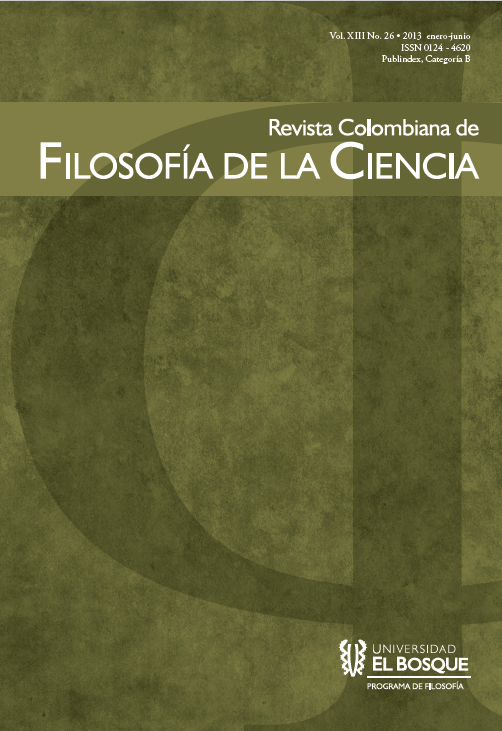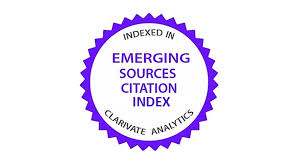Acerca de la unicidad de la sustancia en química
DOI:
https://doi.org/10.18270/rcfc.v13i26.1650Resumen
El problema de determinar en qué consiste la sustancia química ha sido ampliamente
debatido en el campo de la filosofía de la química. Dado el desacuerdo respecto del
significado de la expresión “sustancia química”, nos preguntamos si es posible hallar un
único criterio para identificar cada sustancia química. Abordar este problema conduce a
distinguir entre los distintos dominios de la química: macroscópico, molecular y cuántico.
Esta distinción pone en evidencia que no es posible identificar unívocamente la
sustancia química en todos los dominios; se evalúan entonces los problemas que surgen
de esta imposibilidad.
Descargas
Referencias bibliográficas
Bent, H. New Ideas in Chemistry from Fresh Energy for The Periodic Law. Bloomington:
Author House, 2006.
Born, M. & Oppenheimer, J. R. “Zur quantentheorie der molekeln”. Annalen
der Physik 84 (1927): 457-484.
Earley, J. “How chemistry shifts horizons: element, substance, and the essential”.
Foundations of Chemistry 11 (2009): 65-77.
Hendry, R. “Substantial confusion”. Studies in History and Philosophy of
Science 37 (2006): 322-336.
—. “Microstructuralism: problems and prospects”. Stuff - The Nature of
Chemical Substances. Eds. J. Van Brakel & K. Ruthenberg. Würzburg:
Königshauen & Neumann, 2008. 107-121.
Holden, N. “Atomic weights and the International Committee - a historical
review”. Chemistry International 26 (2004 January-February). En línea.
Kragh, H. “Conceptual changes in chemistry: The notion of a chemical
Element, ca. 1900-1925”. Studies in History and Philosophy of Modern Physics
B 31 (2000): 435-450.
Kripke, S. Naming and Necessity. Oxford: Blackwell, 1980.
Labarca, M. & Lombardi, O. “Why orbitals do not exist?”. Foundations of
Chemistry 12 (2010a): 149-157.
—. “Acerca del status ontológico de las entidades químicas: el caso de los
orbitales atómicos”. Principia - Revista Internacional de Epistemología 14
(2010b): 309-333.
Labarca, M. & Zambón, A. “Un reconceptualización del concepto de
elemento como base para una nueva representación del sistema periódico”.
Educación Química 24 (2013): 63-70.
Lewowicz, L. & Lombardi, O. “Stuff versus individuals”. Foundations of
Chemistry 15 (2013): 65-77.
Lombardi, O. & Castagnino, M. “Matters are not so clear on the physical
side”. Foundations of Chemistry 12 (2010): 159-166.
Lombardi, O. & Pérez Ransanz, A. R. Los múltiples mundos de la ciencia. Un
realismo pluralista y su aplicación a la filosofía de la física. México: UNAMSiglo
XXI, 2012.
Needham, P. “A critique of the Kripke-Putnam conception of water”. Stuff -
The Nature of Chemical Substances. Eds. J. Van Brakel & K. Ruthenberg.
Würzburg: Königshauen & Neumann, 2008. 93-105.
Paneth, F.A. “The epistemological status of the chemical concept of element”.
British Journal for the Philosophy of Science 13 (1962): 1-14 (Part I) y 144-160
(Part II) [reimpr. en Foundations of Chemistry 5 (2003): 113-145].
Putnam, H. “The meaning of ‘meaning’”. Mind, Language and Reality, Philosophical
Papers. Vol. 2, Cambridge: Cambridge University Press, 1975.
-271.
—. Reason, Truth and History. Cambridge: Cambridge University Press, 1981.
Ruthenberg, K. “Paneth, Kant and the philosophy of chemistry”. Foundations
of Chemistry 11 (2009): 79-91.
Scerri, E. R. “What is an element? What is the periodic table? And what does
quantum mechanics contribute to the question?”. Foundations of Chemistry
(2012): 69-81.
Schwarz, W. H. E. “Recommended questions on the roads towards a scientific
explanation of the periodic system of the chemical elements with the help
of the concepts of quantum physics”. Foundations of Chemistry 9 (2007):
-188.
Schummer, J. “Matter versus form, and beyond”. Stuff - The Nature of Chemical
Substances. Eds. J. Van Brakel & K. Ruthenberg. Würzburg: Königshauen
& Neumann, 2008. 3-18.
Van Brakel, J. Philosophy of Chemistry - Between the Manifest and the Scientific
Image. Leuven: Leuven University Press, 2000.
—. “Pure chemical substances”. Stuff - The Nature of Chemical Substances. Eds.
J. Van Brakel & K. Ruthenberg. Würzburg: Königshauen & Neumann,
145-161.
Van Brakel, J. & Ruthenberg, K. (eds.) Stuff - The Nature of Chemical Substances.
Würzburg: Königshauen & Neumann, 2008.
Vihalemm, R. “The autonomy of chemistry: old and new problems”. Foundations
of Chemistry 13 (2011): 97-107.
Weisberg, M. “Water is not H2O”. Philosophy of Chemistry: Synthesis of a New
Discipline. Eds. D. Baird, E. Scerri & L. McIntyre. Dordrecht: Springer,
337-345. Boston Studies in the Philosophy of Science 242.
Descargas
Publicado
Cómo citar
Número
Sección

| Estadísticas de artículo | |
|---|---|
| Vistas de resúmenes | |
| Vistas de PDF | |
| Descargas de PDF | |
| Vistas de HTML | |
| Otras vistas | |











